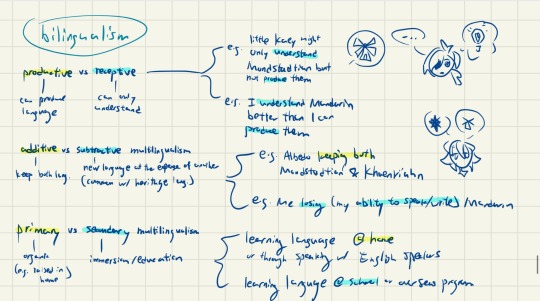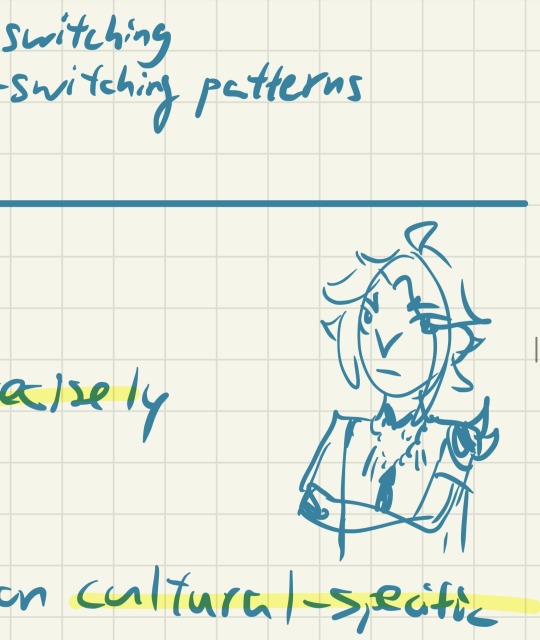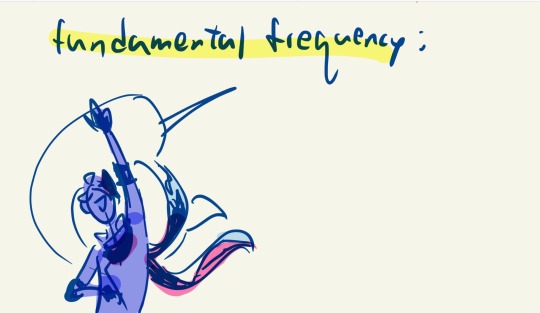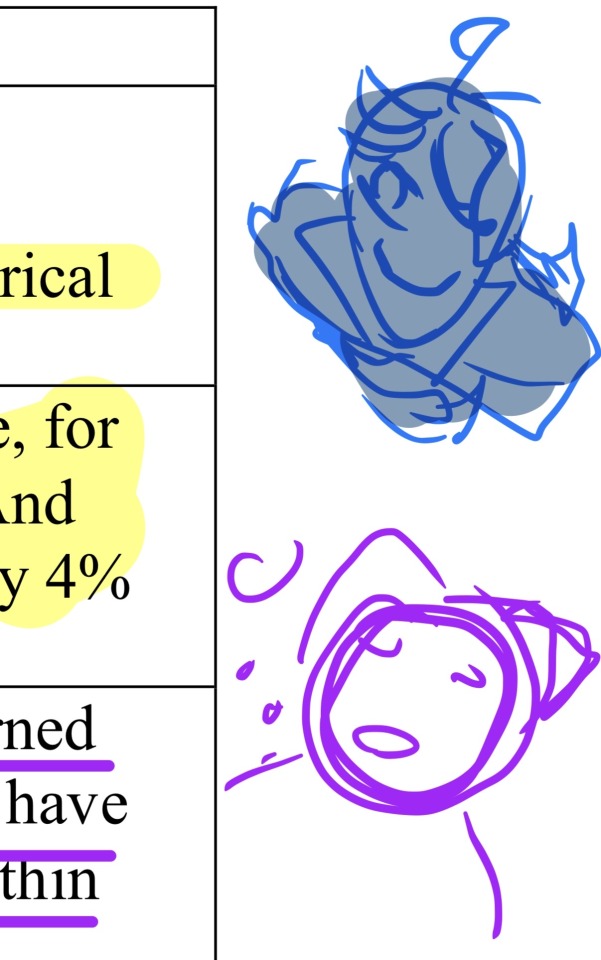#multilingualism
Text
Queer Multilingualism Linguistics Survey - 2023 ; CLOSED
Hi! My name is Gabe, and I am an undergraduate Linguistics student. You may have seen me put out a linguistics survey previously; this was for a graduate course, and I am still organizing that data and working on that paper. However, I have another research paper in a different linguistics course on Globalization of queer identities, and how language may affect the way queer identities are viewed and talked about. I am running another survey to collect data for this paper as well.
If you are queer and bilingual/multilingual, please consider taking this survey! How long it will take depends on the depth of your answers, but I would say 15-20 minutes is maybe a good estimate.
The survey can be found here, and I ask that you please reblog so it can reach more people! The survey will close on Friday, April 14th, at some point, so that I can begin organizing my data.
Thank you!
226 notes
·
View notes
Text
Can't hear you over the sound of my love for ancient languages.
109 notes
·
View notes
Text
Whenever a death eater tried to do legilimens on a bi/multilingual student’s brain, they weren’t able to get much because everything was in an incomprehensible mish-mash of different languages in a pattern completely incomprehensible to the monolingual brain.
#also some students have adhd on top of that#those students don’t even need to learn occlumency#their brains are so chaotic and frightening to outside observers that any attempted legilimancy results in the intruder pulling out ASAP#like IMMEDIATELY#mod des#Harry Potter#hogwarts headcanon#bilingualism#trilingualism#multilingualism#ADHD shit#death eaters when faced with a neurodivergent person be like ‘WTF do I do with this?!’#oh!#also!#fuck jkr
105 notes
·
View notes
Text
a cute lil poem i wrote cus a bitch is lowkey struggling

nothing tastes as good as skinny feels
except for the pegao at the bottom of the pot, a mixture of char, chicken stock, salt and bay leaf
nothing tastes as good as skinny feels
except for lukewarm soda on the beach, syrup dribbling down my chin and sticking my chain to my chest
and the pineapple upside down cake my grandmother used to make, the kind with canned pineapple circles and syrupy cherries in the center of each pineapple slice
and coming back from the beach, sun soaked and tired, passing a mango in between lips as we laugh about the juice that drags from our lips
the last drop of caribbean beer —red stripe— in a can a quick sting, a drop of the islands somewhere we can never return
nothing tastes as good as skinny feels
except strawberries late at night, fresh from the carton and sweeter than life itself
and the mints from the bottom of your grandmothers purse
and chicken pad thai with extra peanuts
and laughing over sushi
and mangonada with a little extra chamoy and guava nectar
and sprite mixed with passionfruit juice on christmas eve in between stolen sips of crémas
the bites of fried food the salon ladies give you during the five hours in the chair getting your hair braided
the secret bits of marinade doused in pikliz the aunties slip you before anyone else, their finger pressed against their lips, smiling
the cookies that come in the circular tin, the same tin that will later be filled with buttons or napkins
coffee after a sleepless night, eyes hazy with sleep
the extra diri tante slips you after a poor attempt at speaking kréyol back to her, sealed with a smile and discreet nod that says 'keep practicing and you'll remind me of your cousin'
the bundt cake my aunt makes that i’m positive is laced with something, because when was bundt cake ever this good
the lemonade the same auntie makes, out of country crock powder and probably too much domino sugar
sucking the meat off the pit of a mango, gently nibbling, trying to get the last dregs of juice before throwing it away
welches passionfruit juice paired with stories of a home in the mountains in haiti, the home my father was born into, the home they left behind
cold cola lacaye and stories about my late grandfather, while my uncles slam dominoes at the table, bald heads bobbing and yelling
fresh wings off the grill, that my uncles swear arent burned just charred
they taste good anyway, sweet spicy and tangy all at once
the only thing that tastes as good as skinny feels
is not wasting away in a shell of a body

🩷 reblogs are always appreciated for reach <3
73 notes
·
View notes
Note
do you ever journal in your mother tongue instead of english? would love to hear ur thoughts on this
I do. A simple fact of being raised multilingual the way Indians of my generation are is that some subjects and some conversations only make sense in your mother tongue, and some only in English. I think Anuk Arudpragasam spoke about this seemingly very natural bifurcation of language and hence knowledge and feeling in one of his interviews (I think it's this?).
So my choice of language when I journal is most times a reflection of this. But also, lately, it has been a conscious attempt to get myself to think about and articulate things I've subconsciously reserved for English in Marathi (and to a lesser extent, Hindi).
49 notes
·
View notes
Text
Do other multilingual people also struggle with interjections or onomatopoeia differing vastly between their native language and, for example, English?
I always have to catch myself when I have been writing in English and went “uh-huh” but particularly “uuuh” and “oooh” because in my native language (German) what is the English “ooooh” is “uuuh” and is also pronounced as such. So it’s a bit of a hang up to switch between English “uuuuh, yeah, so that happened” and German “uuuh, [that’s fancy]”
Another thing that has confused people before is German “Eh”/ “Äh” and “ey” because the German equivalent of English “eeeh, so that happened” would be “Äh, ja, [so that happened] and “ey” is a German interjection I can’t put my finger on right now, mostly to catch someone’s attention like English “hey” or for emphasis. But it’s these little words also, “Öh” being a German variant for things like “uuuh, what?”
And of course the beloved “Hä?” which is “huh?” but feels different like “huh” is “what is going on?/ is that so?” and “Hä?” is “the fuck are you talkin’ about?” (Especially with German grannies insisting “Das heißt nicht „hä?“, das heißt „wie bitte?““)
And while I’m at it, I want to say I miss “doch” because of its versatility.
I can’t even say in which capacity this impacts my third and fourth(ish) language because I’m still a beginner and don’t really chat in those but this massive dissonance catches me often because essentially 90% of my online life is in English and currently 80-90% of my WhatsApp conversations are in German (though my cousin, my best friend, and I use so many English loan words or just have the English words at-the-ready quicker than the German words it’s not even funny)
#second language#native german#german#german language#English language#polyglot#multilingual#multilingualism#doch sag ich
76 notes
·
View notes
Audio
Lingthusiasm Episode 77: How kids learn language in Singapore - Interview with Woon Fei Ting
Singapore is a small city-state nation with four official languages: English, Mandarin, Tamil, and Malay. Most Singaporeans can also speak a local hybrid variety known as Singlish, which arose from this highly multilingual environment to create something unique to the island. An important part of growing up in Singapore is learning which of your language skills to use in which situation.
In this episode, your host Gretchen McCulloch gets enthusiastic about how kids learn language in Singapore with Woon Fei Ting, who’s a Research Associate and the Lab Manager at the Brain, Language & Intersensory Perception Lab at Nanyang Technological University in Singapore. We talk about how the rich multilingual environment in Singapore led Fei Ting and the lab to do language documentation while trying to figure out how kids learn to talk in Singapore, creating a dictionary of Red Dot Baby Talk (named after how Singapore looks like a red dot on the world map). We also talk about Singlish more generally, some words that Gretchen has learned on her trip, doing research with kids and parents via Zoom, and the role of a lab manager and other lab members in doing linguistic research.
Read the transcript here.
Announcements:
Our liveshow is in just a few days!! Gretchen will be chatting to Dr Kirby Conrod (from our episode about the grammar of singular they) about language and gender on February 18th (Canada) slash 19th (Australia)! You can find out what time that is for you here. This liveshow is for Lingthusiam patrons and will take place on the Lingthusiasm Discord server. Become a patron before the event to ask us questions in advance or live-react in the text chat. This episode will also be available as an edited-for-legibility recording in your usual Patreon live feed if you prefer to listen at a later date. In the meantime: ask us questions about gender or tell us about your favourite examples of gender in various languages and we might include them in the show!
In this month’s bonus episode we get enthusiastic about what we've been up to in 2022 and what's coming up for 2023. We also talk about our favourite linguistics paper that we read in 2022 slash possibly ever: okay, yes, academic papers don’t typically do this, but this paper has spoilers, so we STRONGLY recommend reading it yourself here before listening to this episode, or check out the sample paragraph on the Patreon post. Join us on Patreon now to get access to this and 70+ other bonus episodes, as well as access to the Lingthusiasm Discord server where you can chat with other language nerds, and get access to this weekends liveshow!
Here are the links mentioned in the episode:
Woon Fei Ting on Twitter
Lingthusiasm episode ‘What words sound spiky across languages? Interview with Suzy Styles’, the prof whose lab Fei Ting works in
BLIP lab at NTU on Facebook
‘Creating a Corpus of Multilingual Parent-Child Speech Remotely: Lessons Learned in a Large-Scale Onscreen Picturebook Sharing Task’ by Woon Fei Ting et al
BLIP lab’s transcription protocol and FAQ
‘Little Orangutan: What a Scary Storm!’ Wordless picture book by Suzy Styles
‘Spiaking Singlish: A Companion to how Singaporeans communicate’ by Gwee Li Sui
Lingthusiasm episode ‘Are you thinking what I'm thinking? Theory of Mind’
You can listen to this episode via Lingthusiasm.com, Soundcloud, RSS, Apple Podcasts/iTunes, Spotify, YouTube, or wherever you get your podcasts. You can also download an mp3 via the Soundcloud page for offline listening.
To receive an email whenever a new episode drops, sign up for the Lingthusiasm mailing list.
You can help keep Lingthusiasm ad-free, get access to bonus content, and more perks by supporting us on Patreon.
Lingthusiasm is on Twitter, Instagram, Facebook, and Tumblr. Email us at contact [at] lingthusiasm [dot] com
Gretchen is on Twitter as @GretchenAMcC and blogs at All Things Linguistic.
Lauren is on Twitter as @superlinguo and blogs at Superlinguo.
Lingthusiasm is created by Gretchen McCulloch and Lauren Gawne. Our senior producer is Claire Gawne, our production editor is Sarah Dopierala, and our production assistant is Martha Tsutsui Billins. Our music is ‘Ancient City’ by The Triangles.
This episode of Lingthusiasm is made available under a Creative Commons Attribution Non-Commercial Share Alike license (CC 4.0 BY-NC-SA).
#language#linguistics#lingthusiasm#episode 77#episodes#interviews#interview#singapore#multilingualism#woon fei ting#blip lab#ntu#nanyang technological university#child language acquisition#Malay#Tamil#Mandarin#Singlish#English
127 notes
·
View notes
Text
Any other systems who are native bi/multilinguals out there? As in, grew up speaking two or more languages? Curious how yalls native language proficiencies present in different alters.
For us, we're all able to speak and understand Mandarin/English, but how easily that comes to us may be different. Some alters prefer speaking Mandarin as it comes easiest to them and need to "translate" words to English in their head when communicating with English speakers. Some of us are the other way around where we prefer speaking English and may need to internally translate words to Mandarin. Some of us are fully fluent in both with no need to translate between languages. Some of us have obviously American accents when speaking in Mandarin but otherwise sound fluent. Some of us have a subtle Chinese accent when speaking English. Between ourselves, we often have conversations that's a mix of Mandarin and English, either swapping between the two languages (code-switching) or one person mainly speaking one language while the other speaks another.
And even if you're not natively proficient in multiple languages (as in you learned a second language in your teenage or later years), I'm still curious how language proficiency may present for yall!
#dissociative identity disorder#did#actually did#actuallydid#did osdd#osddid#cdd#system#system things#plural#plurality#multiplicity#multiple#bilingual#bilingualism#multilingual#multilingualism#linguistics#by cyan#by pink#listen we're the linguistics nerds in this system we are so curious#if we could have the funding and patience to do an actual study on this we would#and if a study already exists please let us know!
75 notes
·
View notes
Text
In 2012 UNESCO predicted that my language will die in 2025
However, many dedicated activists have been working to counter and reverse the trend of parents deliberately not passing on the Igbo language to their children. While Igbo still is not at the level that it should be at, it is heartening to see that it is still alive and is still one of Africa’s major languages.
Some people were displeased with UNESCO but it is not UNESCO’s fault that so many of us are ashamed of who we are and desperately want to be as white as possible.
“However, we’re a colonised people. We hold everything we do to the standard of the white man, so our food, language, and culture have become gentrified. Our children learn Chinese, Spanish and other foreign languages, but there’s a need to reorient our way of life and the value of our languages. We can’t continue to be embarrassed about ourselves. At some point, our culture will become revived and fashionable again.”
#igbo language#igbo#Asụsụ Igbo#langblr#multilingualism#language#languages#multilingual#lingblr#language reclamation#indigenous languages#language learning#african languages
217 notes
·
View notes
Text
This is what happens when I think about fanfic genre and language conventions for too long on a Saturday afternoon.
As my fanfic consumption has recently grown by an exponential degree and I a) have the autistic-with-strong-language-skills brain that I have and b) speak two languages, I've started noticing some really interesting patterns in English-language fanfic writing that I can't unsee. And not being able to unsee them isn't a bad thing, it's just started to make me curious about what's going on behind the scenes. Specifically, I'm wondering about patterns that scream L2 English to me, and are the kind of thing that would have been significantly less likely to spread quickly before the internet? Or maybe I have no idea what I'm talking about?
So a quick google tells me that the tense in question is the present perfect, meaning the "have [verb]" construction. Have been, have got, have worn, have seen although I'll be paying special attention to the possessive have got. English loves a contraction, so it's 0% surprising "person + have" becoming I've, you've, they've, etc. What's interesting to me is when it's how often I'm seeing people drop "got" when it's possessive, so instead of "I've got a purple hat" it will be the much more archaic-feeling (to me) "I've a purple hat"?
Maybe it's not about multilingualism? Maybe there are plenty of L1 or monolingual English speakers doing it too? Maybe it's not about fanfic. Maybe that construction isn't even that archaic? I'm not a linguist or even that good at explaining grammar in either language I speak because I didn't learn them academically, but being someone who Thinks About Language a lot means I pay way more attention to usage. And that's a usage I noticed so I figured I would ask around!
#actually autistic#with adhd#two tastes that are...a lot together#fanfic writing#multilingualism#bilingualism#english as a second language#posts nobody will even want to read?#poll#tumblr polls#my polls#autistic language nerd#burning questions#unscientific polls
13 notes
·
View notes
Text

Though I’ve realized I can indeed type and converse in Mandarin, even if they sound like they’re translated from Japanese (‘cause I drop the subjects)
aside from that, it seems I’ve been thinking about Childe more lately







#dusk fan art#Genshin impact#Kaeya#albedo#Neuvillette#Tartaglia#Childe#Xiao#linguistics#sociolinguistics#multilingualism#bilingualism
19 notes
·
View notes
Text
Every now and then, an event of some sort reminds me that I am, in fact, still fluent in my mother tongue, and my heart does a little happy dance.
48 notes
·
View notes
Text
What is a Multidialectal Nahuatl Language Class?
What is a dialect?
A form of a language that people speak in a particular part of a country or region, containing some different words and grammar, etc.:
-regional dialect: the various regional dialects are still spoken locally.
-in dialect: The poem is written in northern dialect.
What does multidialectal mean?
Using more than one dialect which is a form of a language that people speak in a particular area.
-a multi-dialectal environment.
-it is difficult for newcomers to adapt to the multilingual and multidialectal nature of Mesoamerican Indigenous Languages.
What is a Multidialectal Nahuatl language class?
A multidialectal approach to learning Nahuatl involves considering and respecting the various dialects spoken across Nahuatl-speaking regions, rather than focusing on just one dialect, such as Classical Nahuatl. This approach is in contrast to older methods that primarily focused on CN (Classical Nahuatl), which is more formal and no longer spoken. For this reason, it is not always applicable to everyday conversations.
What about Classical Nahuatl?
In the past and in the present, people believed and still believe that learning CN was and is the ideal way because it's the language in "its purest form" and that it's the "mother dialect." However, that is far from the truth because CN is a central dialect that was compiled under the authority of Spanish friars for the purpose of evangelization (spreading their beliefs). Furthermore, CN is taught as a classical language, as a dead language and the methods used are only for purposes of reading literature thus can also be called Literary Nahuatl. Because of this, it has limitations, as it is not useful in everyday situations, making it difficult to understand and communicate in informal settings.
Does a multidialectal approach mean learning all dialects at the same time?
No. The multidialectal approach to Nahuatl recognizes the language as a diverse collection of dialects that vary based on social, cultural, and geographic contexts. This approach aims to raise students' awareness of the language's diversity, allowing them to learn various dialects starting from one base dialect. It also incorporates differences in word usage, meanings, and regional variations, acknowledging that each region, city, and town has its own unique version of Nahuatl.
How does the multidialectal approach to learning Nahuatl address classroom concerns and challenges?
Implementing the multidialectal approach involves adhering to these principles, addressing common concerns, and overcoming challenges in the classroom. Overall, it provides a more flexible and practical way to learn Nahuatl, tailored to the diverse needs of Nahuatl-speaking communities, language revitalizers, and individuals seeking to reclaim their own dialects.
What We Do
We are a collective of language workers: learners, teachers and revitalizers. Besides teaching and learning, we work in language revitalization projects and offer trilingual translation services: Nahuatl, English & Spanish. To stay up-to-date with our offerings, please go here: https://linktr.ee/speaknahuatl.
Sources
•https://dictionary.cambridge.org/us/dictionary/english/multidialectal
• https://dictionary.cambridge.org/us/dictionary/english/dialect
• https://www.merriam-webster.com/dictionary/multidialectal
• https://emmatrentman.com/2022/01/14/does-a-multidialectal-approach-mean-teaching-all-of-the-dialects/
• Teachers at Speaknahuatl.com
Instagram Version: https://www.instagram.com/p/C32ki1Ayw4u/?igsh=Mmxxb3owcDl1c3U5
#dialect#regionaldialect#indigenouslanguages#multilingualism#multidialectal#Nahuatl#languagelearning#languageeducation#languagepedagogy#languageclass#culturaldiversity#languageawareness#languagevariations#classicalnahuatl#languageRevitalization#trilingual#translation#speaknahuatl
2 notes
·
View notes
Text
We stan linguistic realism
11 notes
·
View notes
Text
Prompt #223
System A works as a highly respected translator, well-known for having mastered numerous languages. It's actually a rather simple trick that makes this possible: their headmates each know two or three languages, enough to overlap and translate with each other, but few enough that no individual headmate feels overwhelmed with all the languages they know. Through this delegation of knowledge and internal communication, they're able to make their career possible.
But what happens when they're teamed up with Translator B for a big project, who sees System A as their rival? Ack, a rivalry wasn't in the job description!
#plural system#pluralgang#pluralprompt#plurality#prompt#prompt blog#multilingualism#translator#coworkers#rivalry#jobs
25 notes
·
View notes